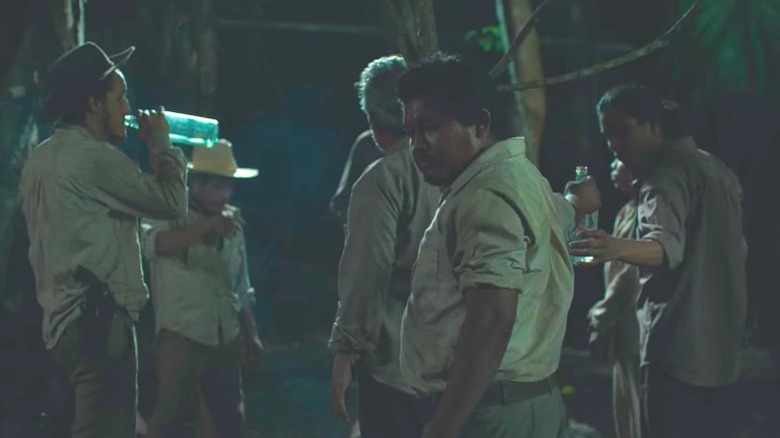The Ending Of Tragic Jungle Explained
Contains spoilers for "Tragic Jungle"
Set during the early 1920's, on the border between Mexico and Belize, "Tragic Jungle" follows a group of Mexican gum workers known as chicleros, who encounter a Belizean woman named Agnes (Indira Rubie Andrewin) in the dense jungle. The chicleros work by slashing the bark of rubber trees to expose the milk within and make chewing gum. Agnes is on the run from an Englishman (Dale Carley) who wants to marry her, and is found by the workers after her companions are killed.
Due to the language barriers between Agnes and the Mexican workers, she is silent for the majority of this Netflix movie, but this only seems to add to her mystique. In a time when superstitions and myths abound, the presence of the entrancing young woman incites antagonism among the group and appears to arouse the demonic Xtabay — a bewitching female seductress who is fabled to lure men to their doom. Agnes eventually begins to represent the embodiment of this myth, and as events unfold we see the beauty and ruthlessness of man and nature alike.
The jungle is a living being that does not take kindly to disrespect
At the beginning of "Tragic Jungle," one of the chicleros, Jacinto (Mariano Tun Xool), warns us in voiceover, "The jungle can give a lot, but it can take a lot too." The wilderness they inhabit has its own characteristics and complexities as we witness the treasures and the treacheries it holds. According to the film's director, Yulene Olaizola, "Gum workers penetrated deep into the jungle for as long as eight months at a time. 'Tragic Jungle' takes viewers into this hostile environment, absorbing them in the human conflicts brewing within it." (via The Film Stage)
As the men take advantage of what their surroundings have to offer, we see how the territory also balances the scales. This is not vengeance, but more akin to natural ancient accounting, where a sacrifice is needed in order to receive rewards. When one of the workers falls from a high treetop, there is no extended panic or distress in the event. The death, and subsequent devouring of the corpse by a leopard, is almost monotonous in the context of the jungle. The message is clear: if you are disrespectful to the bounty within nature, it will eventually take retribution as compensation.
Agnes transforms from inexperienced virgin to mystical temptress
When we first meet Agnes she is a virgin, and the victim of her pursuer. After her co-conspirator Florence (Shantai Obispo) is mortally wounded, Agnes asks the dying woman, "How does it feel like to be with a man? ... You've been with so many men. I wish I was a beautiful flower like you." This initial characterization is in stark contrast to her later representation as a sexually empowered woman. During her slow transformation, her allure takes on a mystical quality as it is intertwined with the legend of the siren-like Xtabay. According to The Yucatan Times, the demonic "La Xtabay" takes the form of a beautiful woman in a white dress and enchants men to have sex with her before devouring them.
Agnes' very presence arouses the insatiable lust among the men and though an unwilling captive, she begins to understand the power and influence of her sexuality. As she takes greater possession of her desirability, the bewitching influence of Xtabay becomes more prominent through Agnes. The supposed awakening of the demon parallels Agnes' own sexual awakening. Although the demonization of a woman's sexuality has its misogynistic connotations, the story is ultimately one of empowerment that illustrates the internal untapped strength embodied within every woman.
Ultimately it's the men's own lust and greed that is their downfall
Although the mysterious powers of Xtabay and the complex energies of the jungle itself may have had an influence on the events of "Tragic Jungle," it exposes the weakness of character among the men as the cause of their dire fates. Though the leader of the workers, Ausencio (Gilberto Barraza), initially orders that Agnes is not to be harassed, he eventually gives into his own personal lust along with the other men. Similarly, their greed leads them to ambush and steal the haul of another group, and cross the treacherous border in an effort to betray their employer and get rich.
As the men begin to die in rapid succession — due to jealousy-fueled homicide, attacks from pursuing Englishmen, fatal accidents, or disease — we realize that these calamities are not the work of external forces, but the result of deliberate and selfish internal decisions. You can blame seductress demons, curses, and the laws of nature all you want, but at the end of the day it is the flawed will of the men that is their ultimate downfall. The circumstances they faced did not compel them to take the actions that led to their demise, but instead created an opportunity for them to be the tools of their own destruction.



